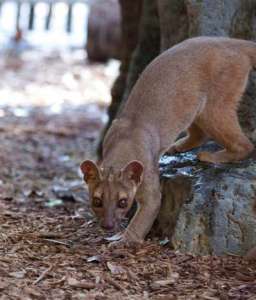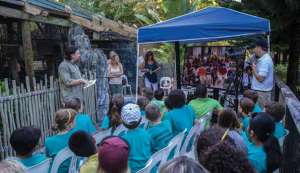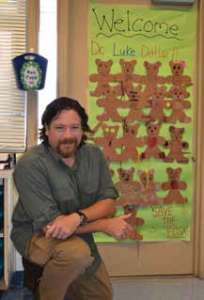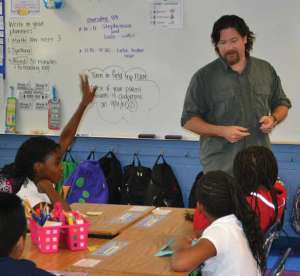Partner to Inspire a New Generation
by Tim L. Tetzlaff
Director of Conservation & Communications | Naples Zoo at Caribbean Gardens
 Remember sitting in front of the television when nature specials were an event. Like me, memories may wash over you when you hear the bass drum and inspiring brass
Remember sitting in front of the television when nature specials were an event. Like me, memories may wash over you when you hear the bass drum and inspiring brass
theme music that opens up each National Geographic special announcing we were about to be transported to far away places from green jungles to white mountain peaks – or into the silent world beneath the waves of Jacques-Yves Cousteau. And their gifted writers and photographers inspired many to a broader appreciation of nature as we flipped through the pages of National Geographic magazine.
While the imagery was amazing, it was the men and women who took us on these journeys that made it truly special. And while today’s children are inundated with opportunities to see nature videos anywhere from 24-hour nature channels to YouTube, iconic figures like those can be harder to come by – unless you’re a fourth grade student in Collier County Public Schools (CCPS).
Meet Dr. Luke Dollar. The local kids already have. A National Geographic Explorer, Luke is recognized and supported by the National Geographic Society as a uniquely gifted and inspiring young scientist and storyteller. More than 15 years ago, he began researching the fosa (formerly spelled fossa), a little known, but critically important, carnivore on the island of Madagascar. And here in Collier County, the nearly life-sized face of this conservation scientist looks out from the cover of the atlas-sized National Geographic Science text into local classrooms inviting fourth graders into his world.
Students follow in his footsteps steps learning the scientific method through his work on the island nation.
It’s a great program, but it got even better recently. Knowing of Naples Zoo’s support for Luke’s conservation programs in Madagascar, Curt Witthoff, CCPS Coordinator
for K-12 Science & Environmental Education, approached us a few years ago to see if Luke would be able to connect with the students.
As Naples Zoo President and CEO Jack Mulvena states, “It was a natural. We have helped financially support his conservation projects in Madagascar for the last decade.
And Luke had been to Naples a couple times before – in fact, one of the endangered fosas born here was named in honor of him. We’re also one of the few zoos in the nation
where guests can view fosas.”
Luke also loved the idea and through an enthusiastic collaboration between Naples Zoo, Collier County Public Schools, and National Geographic Learning (NGL), Luke was able to step out of the pages and into local classrooms for the last two years.
As school starts, students begin using NGL’s National Geographic Science – Florida Edition for K-5 science instruction. This program incorporates videos and images from National Geographic and real-world accounts from their renowned explorers and scientists like Luke. Right after kids learn about his work, Luke comes to Naples where he speaks to two classes of students on a special trip to Naples Zoo. Even better, the incredible CCPS technology department broadcasts Luke live to all the fourth grade
classes across the County including a two-way link that enables them to ask questions from their schools.
Collier County Public Schools Superintendent Dr. Kamela Patton expressed her excitement about the event: “Last year I enjoyed being at the Naples Zoo to watch and
experience it live. This year, I was at one of our elementary schools and had the opportunity to be in a fourth grade classroom where two classes were together staring intently
at the screen! They were beyond engaged.”
After the presentation at the Zoo, Luke and I along with CCPS science staff and the National Geographic Learning team take the show on the road to visit dozens of classrooms over two days. As Vincent Grosso, Senior Vice President of National Geographic Learning, states, “We sponsor events, such as this one at the Naples Zoo, as a way to engage students and bring learning to life. Students are granted the ability to apply what they learn in the classroom and meet the explorers that they read about in their
science studies.” To a fourth grader, that means meeting one of your generation’s Jacques Cousteaus. And I gladly attest to seeing the excitement on their faces when Luke walks into their room.
Witthoff agrees, “Providing over 3,000 fourth graders with the opportunity to meet a scientist like Dr. Luke Dollar can be a life-changing event for kids. If you saw the kids clapping and physically shaking at the opportunity to meet him in person, you’d know what I’m talking about.”
 CCPS District Science Specialist Linda DeLuca shares the excitement. “We were thrilled to have Dr. Dollar return to Collier again so our students can meet with the world’s expert in fosa research.” To connect kids and science even further this year, DeLuca is working with Luke and the Zoo on a Dollars for Collars program where students are
CCPS District Science Specialist Linda DeLuca shares the excitement. “We were thrilled to have Dr. Dollar return to Collier again so our students can meet with the world’s expert in fosa research.” To connect kids and science even further this year, DeLuca is working with Luke and the Zoo on a Dollars for Collars program where students are
fundraising for GPS wildlife collars that Luke will place on fosas. For the first time, Luke and other researchers will have 24/7 data to better inform conservation plans for this endangered species. Beyond fourth grade, plans are being discussed for high school students to take those GPS data points to create websites with near real-time maps tracking the fosas in Madagascar.
Repeating the sentiment of multiple agencies, departments, and individuals too many to name that make this all possible, we look forward to welcoming Dr. Dollar for years to come. Luke summarizes his commitment to education best when he simply states, “The kids of today are the scientists of tomorrow.” And with inspiring conservationists like Luke Dollar, we all have something great to look forward to from these kids.



Leave a Reply
Want to join the discussion?Feel free to contribute!